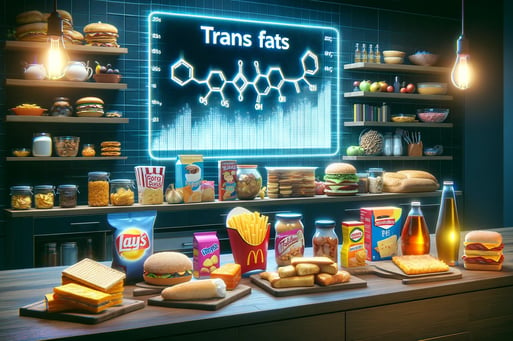Trans Fats
The Hidden Enemy in Our Diet
HEALTH


Imagine a villain in the world of nutrition, lurking in your favorite foods, unseen yet potent. This villain is not the often-vilified sugar, but something more insidious: trans fats. In the saga of heart health, trans fats have emerged as a primary antagonist, hiding behind the guise of deliciousness while plotting against our cardiovascular well-being.
The Sinister Nature of Trans Fats:
Trans fats, or partially hydrogenated fats, are the nutrition world's version of a wolf in sheep's clothing. While we've been busy cutting down on refined sugars (rightly so), trans fats have been silently contributing to a host of health problems. Statistics indicate that in some countries, up to 30% of cardiovascular-related deaths could be attributed to these fats.
Understanding Trans Fats:
These fats come in two types: the naturally occurring trans fats found in some animal products, which, when consumed in moderation, aren’t particularly harmful, and the artificial, industrially produced trans fats. The latter are created through a chemical process that alters the structure of saturated fats, making them more shelf-stable but significantly more harmful to our health.
The Heart of the Problem:
Trans fats are a cardiovascular nightmare. Just a 2% increase in trans fat consumption can spike the risk of heart disease by 35%. Countries like Denmark have seen a dramatic decrease in cardiovascular deaths by banning these fats, inspiring stricter regulations across the European Union.
The Invisible Culprit in Common Foods:
The primary battlefield for trans fats is processed foods. Margarine, a common substitute for butter, is one of the most significant sources of industrially-produced trans fats. These fats sneak into various foods, from pastries and crackers to fast food and even some soup broths.
The European Union's Stance:
Recognizing the danger, the European Union has mandated labeling for foods containing more than 2 grams of trans fats per 100 grams of total fat. This regulation aims to decrease consumption and, consequently, reduce the health risks associated with these fats.
Trans Fats and Health Risks:
The health implications of consuming trans fats extend beyond heart disease. They contribute to the increase in LDL cholesterol (the bad kind) and decrease HDL cholesterol (the good kind), disrupting the delicate balance crucial for vascular health. This imbalance can lead to narrowed blood vessels, restricted blood flow, and elevated risks of heart attacks and ischemic strokes.
A Double Whammy: Diabetes and Inflammation:
Trans fats don't stop at damaging the heart; they also increase the likelihood of developing diabetes and insulin resistance. They are even linked to chronic inflammatory conditions like rheumatoid arthritis, lupus, and autoimmune disorders such as multiple sclerosis.
A Cancer Connection:
Recent studies have uncovered a troubling link between trans fat consumption and an increased risk of certain cancers, particularly those affecting individuals over the age of 40.
Navigating the Trans Fat Maze:
Avoiding trans fats requires vigilance. Reading labels is crucial, as these fats are often hidden in plain sight within processed foods. As the food industry adapts to regulations, the replacement of trans fats with less harmful, but still potentially problematic, saturated fats, demands consumer awareness.
Trans fats are a modern-day Trojan horse in our diet, appearing harmless but harboring risks that can compromise our long-term health. While regulations and labeling are steps in the right direction, the onus is on us, the consumers, to make informed choices. Opting for natural, less processed foods can be a simple yet effective strategy in this ongoing battle against trans fats. Next time you reach for that packaged snack or frozen meal, remember that the real key to heart health might lie in your ability to recognize and avoid these hidden dietary dangers. Embrace whole, unprocessed foods, and keep trans fats at bay. Here's to a heart-healthy lifestyle that's not just about avoiding sugar but about understanding the bigger picture of what we put on our plates!



